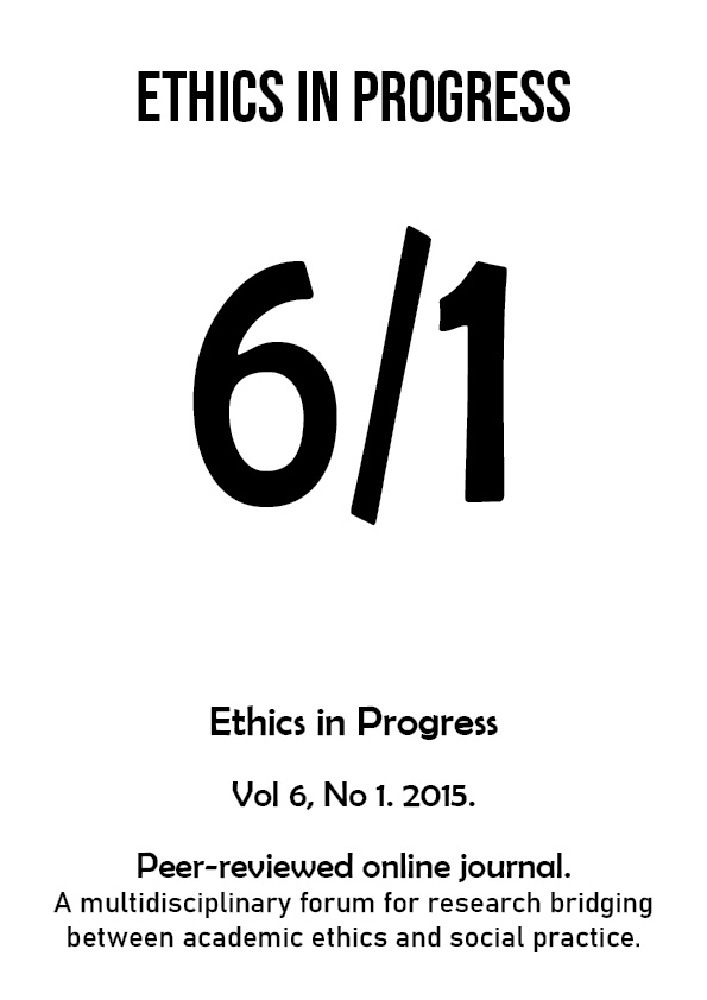Abstract
In this article I discuss one of the most significant areas of bioethical interest, which is the problem of moral enhancement. Since I claim that the crucial issue in the current debate on human bioenhancement is the problem of agency, I bring out and examine the conditions of possibility of selfunderstanding, acting subjects attributing responsible authorship for their actions to themselves. I shall argue that the very idea of moral enhancement, properly understood, fails to justify the claims that enhancing the “biological” factor that plays a part in the process of making moral choices, whether through biomedical or genetic interventions, will actually increase the probability of having “morally better future motives”.References
Arendt, H. 1998. The Human Condition. Chicago – London: University of Chicago Press.
Aristotle, 2009. The Nicomachean Ethics. Trans. D. Ross.New York: Oxford University Press.
Daniels, N. 2013. "Can Anyone Really Be Talking about Ethically Modifying Human Nature." In J. Savulescu & N. Bostrom (eds.), Human Enhancement. Oxford: Oxford University Press: 26-42.
Douglas, T. 2008. “Moral Enhancement.” Journal of Applied Philosophy 25(3): 228-245.
Frankfurt, H. G. 1971. “Freedom of Will and Concept of a Person.” The Journal of Philosophy 68(1): 5-20.
Grimaldi, W. M. A. 1972. Studies in the Philosophy of Aristotle’s Rhetoric (Hermes Einzelschriften). Wiesbaden: Franz Steiner.
Haack, S. 2014. “Brave New World: On Nature, Culture and the Limits of Reductionism.” Invited lecture at a conference Science is All We Need?. Abraham Kuyper Centre, Free University of Amsterdam.
Habermas, J. 2003. The Future of Human Nature. Cambridge: Polity Press.
Habermas, J. 2008. Between Naturalism and Religion. Philosophical Essays. Cambridge: Polity Press.
Harris, J. 2011. “Moral Enhancement and Freedom”. Bioethics 25(2): 102-111.
Kant, I. 1993. Grounding for the Metaphysics of Morals: With on a Supposed
Right to Lie Because of Philanthropic Concerns. Trans. J. W. Ellington, Indianapolis – Cambridge: Hackett Publishing.
Korsgaard, Ch. M. 1989. “Personal Identity and the Unity of Agency: A Kantian Response to Parfit.” Philosophy and Public Affairs 18(2): 101-132.
Korsgaard, Ch. M. 2008. The Constitution of Agency. Essays on Practical Reason and Moral Psychology. Oxford, Oxford University Press.
Korsgaard, Ch. M., Cohen, G. A. et al. 2003. The Sources of Normativity. Cambridge Mass: Cambridge University Press.
Lewandowski, W. 2013. „Genetyczne udoskonalanie a moralna doskonałość”. Etyka 47: 67-83.Moral Perfection and the Demand for Human Enhancement 36
McDowell, J. 1996. Mind and World: With a New Introduction. Cambridge: Harvard University Press.
McDowell, J. 2001. Mind, Values and Reality. Cambridge: Harvard University Press.
Persson, I. & Savulescu, J. 2008. “The Perils of Cognitive Enhancement and the Urgent Imperative to Enhance the Moral Character of Humanity.” Journal of Applied Philosophy 25(3): 162-177.
Persson, I. & Savulescu, J. 2012. Unfit for the Future: The Need for Moral Enhancement. Oxford: Oxford University Press.
Piłat, R. 2013. Powinność i samowiedza. Studia z filozofii praktycznej. Warszawa: Cardinal Stefan Wyszyński University Press.
President’s Council on Bioethics 2003. Beyond Therapy: Biotechnology and the Pursuit of Happiness. New York: Regan Books.
Sandel, M. 2007. The Case Against Perfection. Ethics in the Age of Genetic Engineering. Cambridge, Mass. – London: Harvard University Press.
Savulescu, J. & Kahane, G. 2009. “The Moral Obligation to Create Children with the Best Chance of the Best Life.” Bioethics 23(5): 274-290.
Savulescu, J. & Persson, I. 2012. “Moral Enhancement, Freedom and the God Machine.” The Monist 95(3): 399-421.
Soniewicka, M. 2015. „Biologiczne podstawy moralności w kontekście genetycznego ulepszania człowieka”. In J. Stelmach, B. Brożek, & K.
Eliasz (eds.), Naturalizacja prawa: interpretacje. Warszawa: Wolters Kluwer: 279-298.
Stróżewski, W. 2013. Existence, Sense and Values. In S. T. Kołodziejczyk (ed.), Essays in Metaphysics and Phenomenology. Frankfurt am Main: Peter Lang Edition.
Taylor, Ch. 1976. “Responsibility for Self.” In A. Oksenberg Rorty (ed.), The Identities of Persons. Berkeley, London: University of California Press: 281-300.
Taylor, Ch. 1985. Human Agency and Language. Philosophical Papers I. Cambridge: Cambridge University Press.
Taylor, Ch. 1994. Sources of the Self. The Making of the Modern Identity. Cambridge: Harvard University Press.
Walker, M. 2009. “Enhancing Genetic Virtue. A Project for Twenty-First Century Humanity?.” Politics and the Life Sciences 2(28): 27-47.
Williams, B. 1996. Morality: An Introduction to Ethics. Cambridge: Cambridge University Press.
Williams, B. 2006. Ethics and the Limits of Philosophy. London: Routledge.




